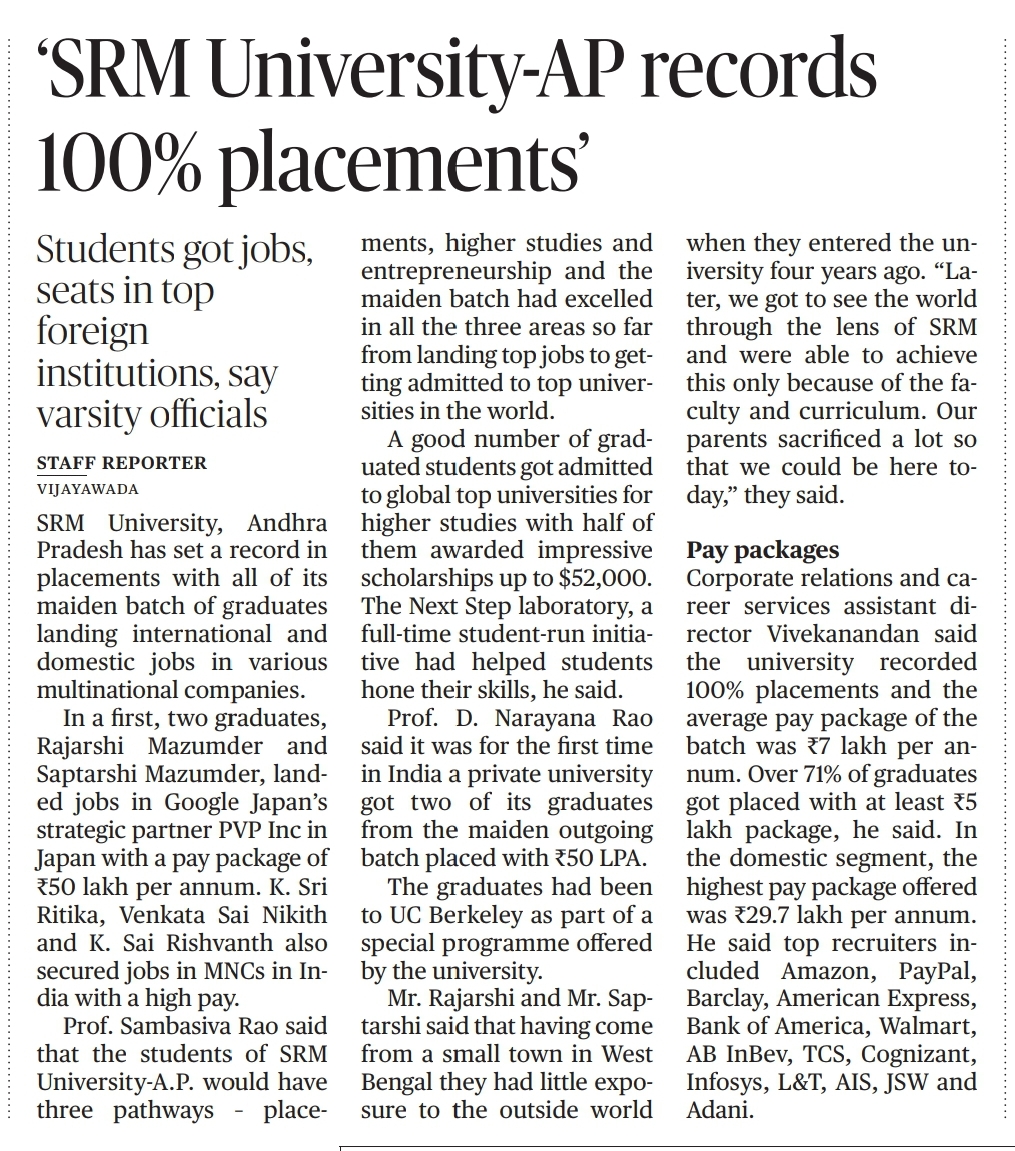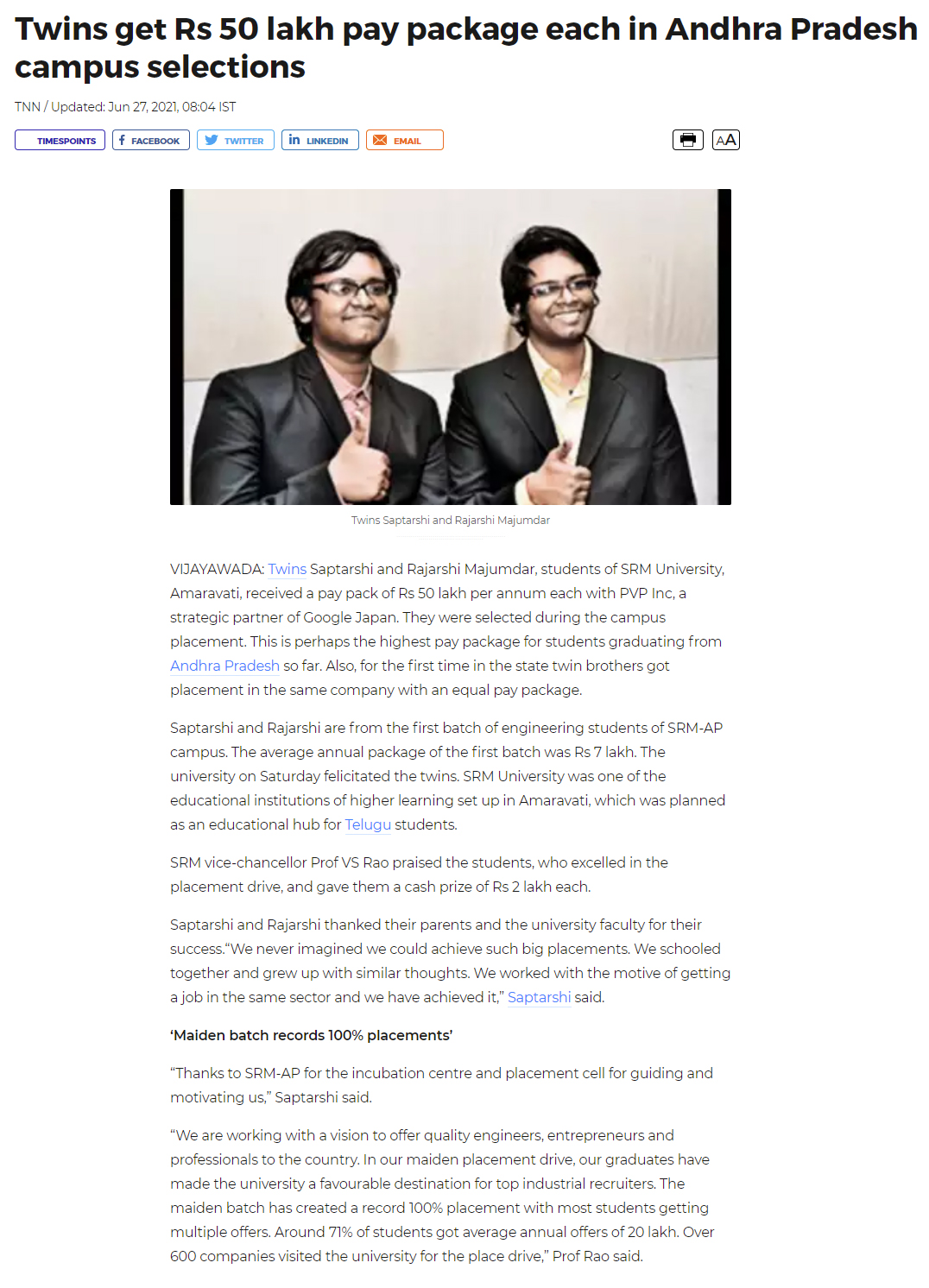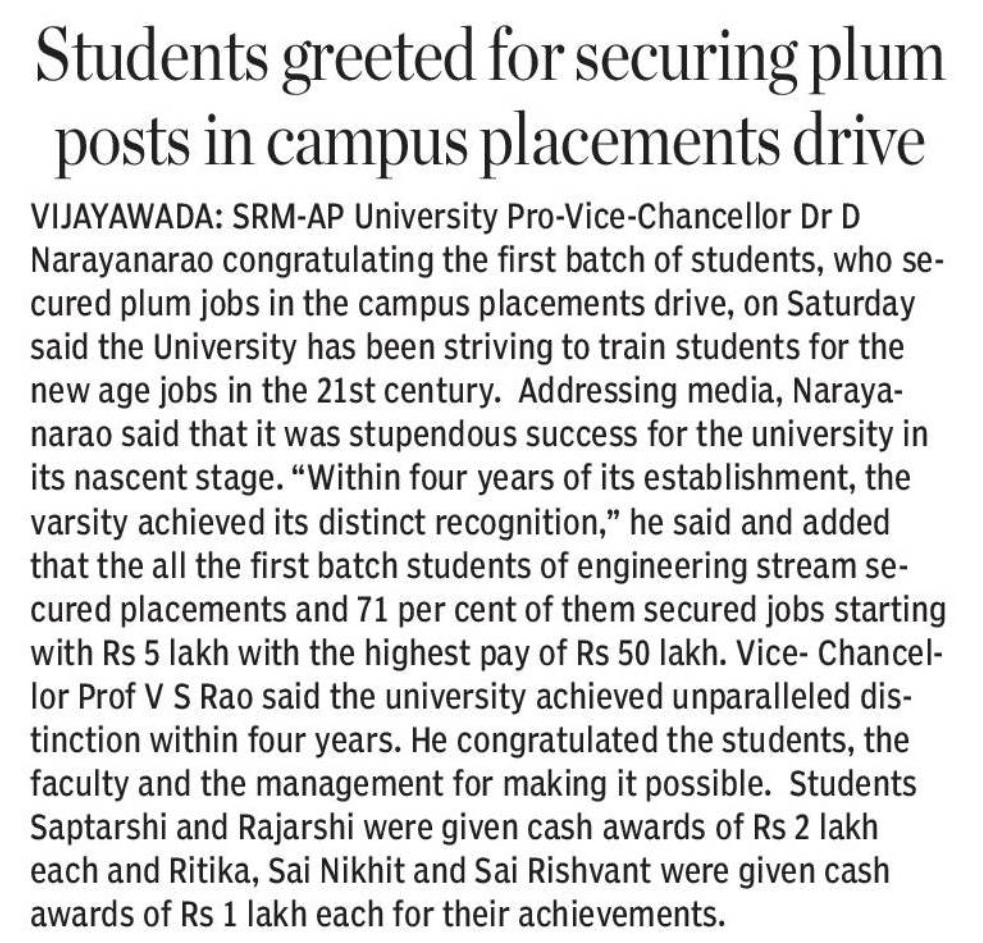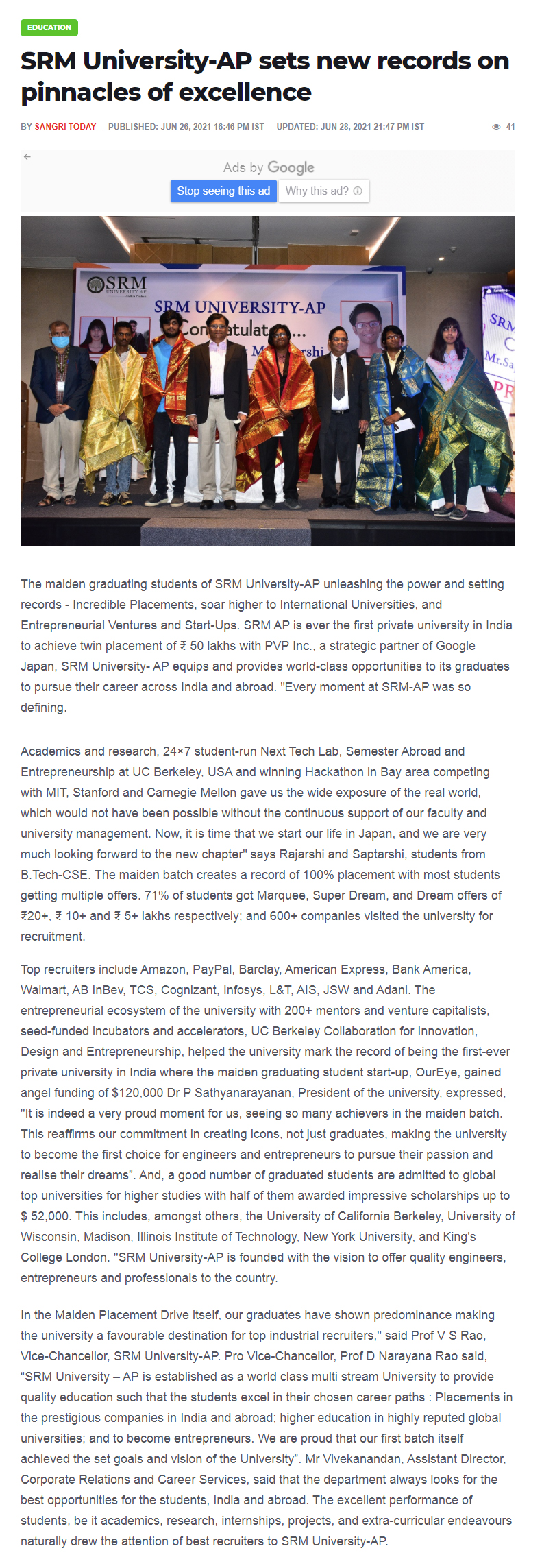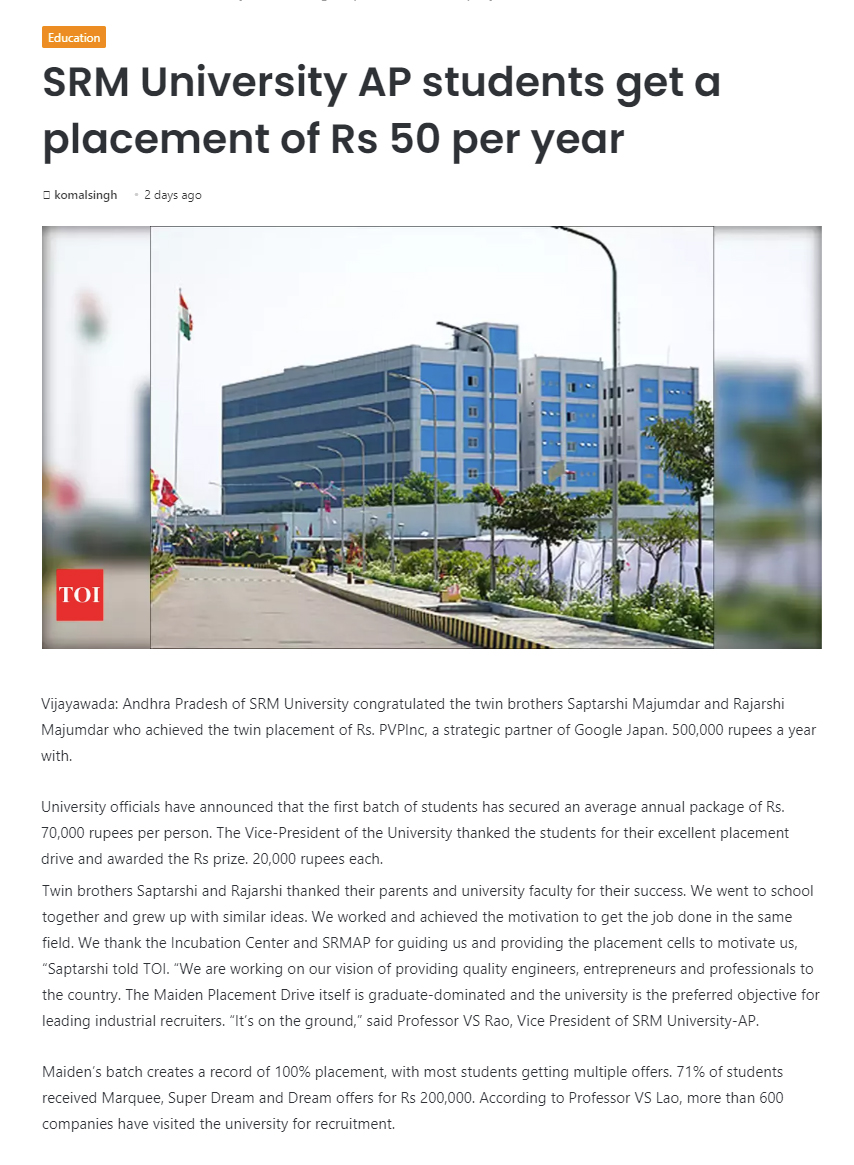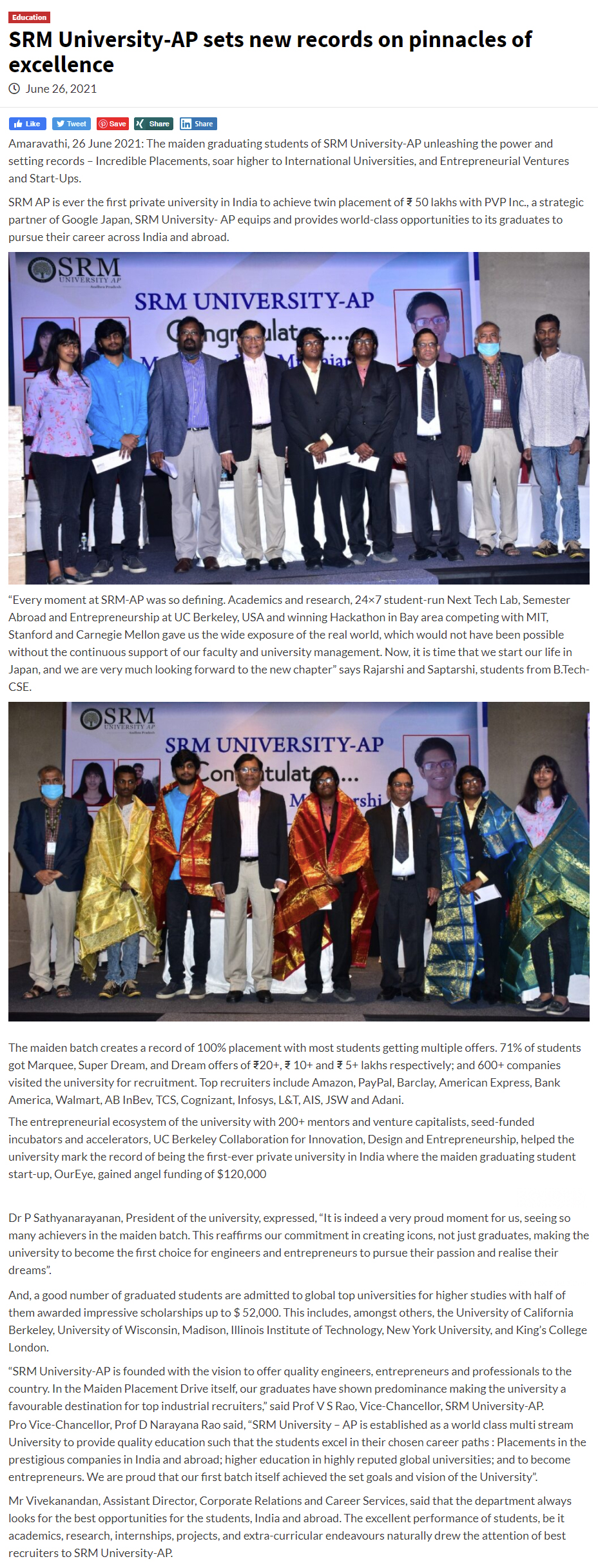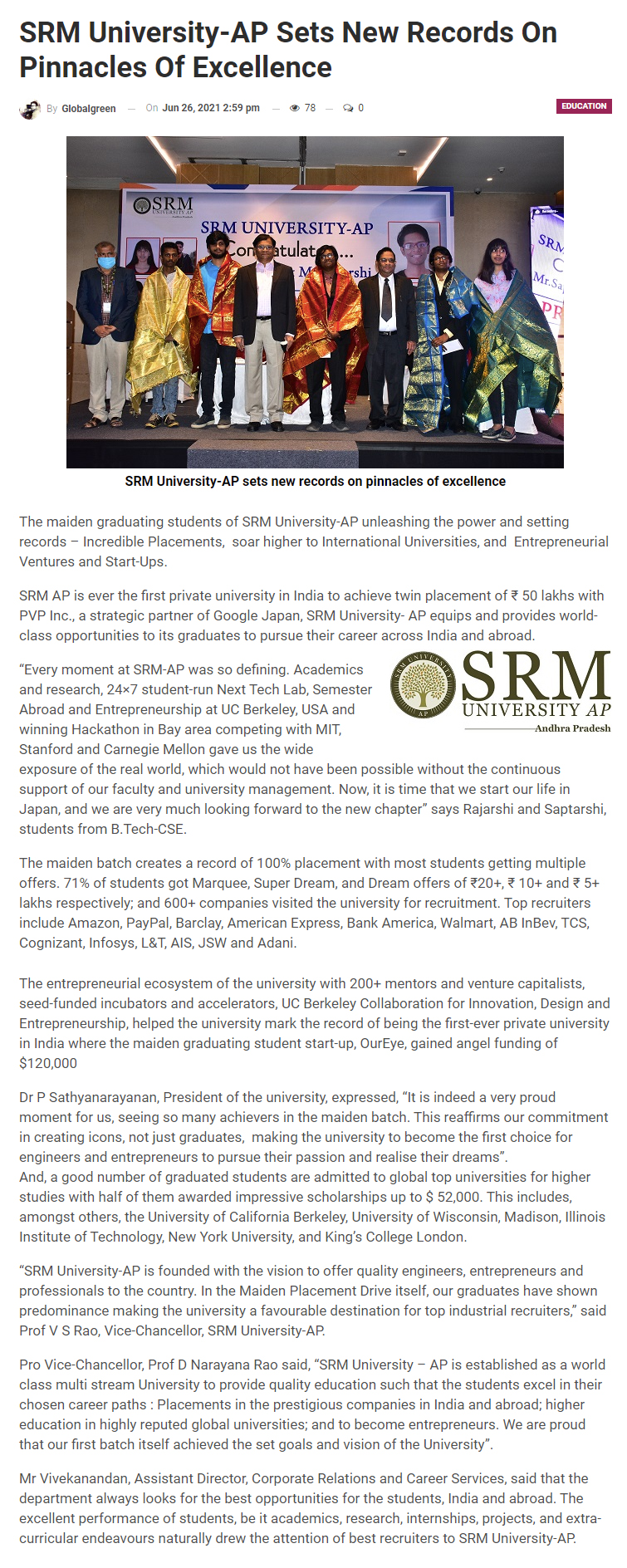- How the ECE curriculum is better than other branches! June 29, 2021
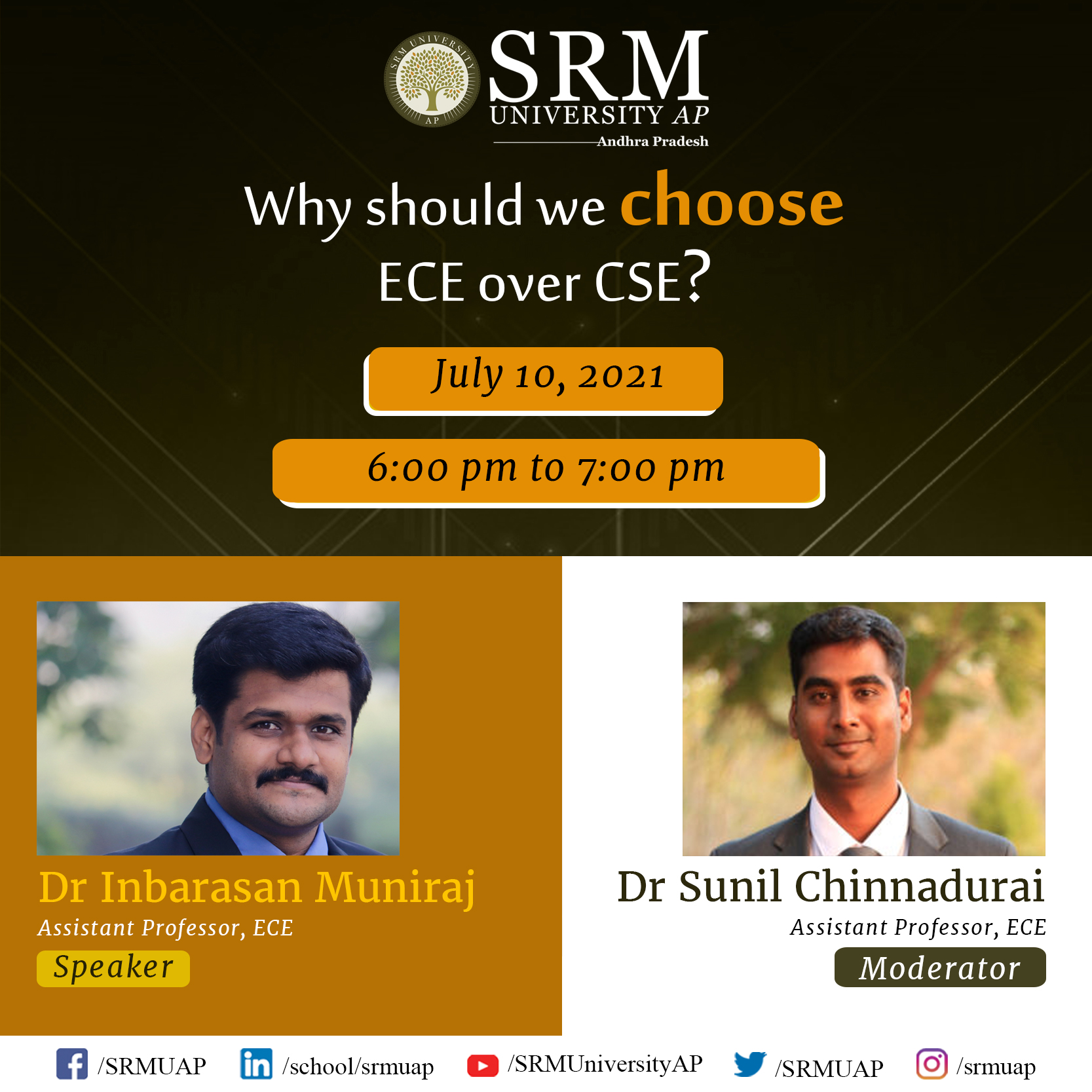 Electronics and Communication Engineering plays an important role in futuristic technologies both in Indian and global markets. For example, 6G, Glasses-free 3D-TV, Autonomous driving, Industry 4.0, Augmented/Virtual Reality and Artificial Intelligence etc. The Department of Electronics and Communication Engineering (ECE) at SRM University-AP is organising a panel session on the topic “Higher Studies Opportunities with ECE” on July 10, 2021, at 6.00 pm. In the session moderated by Assistant Professor Dr Sunil Chinnadurai, Assistant Professor Dr Inbarasan Muniraj will educate the attendees on the reasons why one should choose Electronics and Communication Engineering rather than Computer Science Engineering.
Electronics and Communication Engineering plays an important role in futuristic technologies both in Indian and global markets. For example, 6G, Glasses-free 3D-TV, Autonomous driving, Industry 4.0, Augmented/Virtual Reality and Artificial Intelligence etc. The Department of Electronics and Communication Engineering (ECE) at SRM University-AP is organising a panel session on the topic “Higher Studies Opportunities with ECE” on July 10, 2021, at 6.00 pm. In the session moderated by Assistant Professor Dr Sunil Chinnadurai, Assistant Professor Dr Inbarasan Muniraj will educate the attendees on the reasons why one should choose Electronics and Communication Engineering rather than Computer Science Engineering.The syllabus at SRM University-AP brings up industry-ready ECE graduates incorporating the design thinking curriculum along with advanced courses such as AI-ML, IoT, Embedded systems, Advanced VLSI, Signal Processing, Communication Systems, and Networking which are the current needs of the industry. ECE better than other engineering branches because the top inventions like mobile phone, Computer, Satellite, Internet, 5G/6G, IoT, AR/VR, Holograms, Machine Learning, AI, smart homes/cities, together with some of the recent necessities like CT scan, Oximeter, infrared thermometers are all the products of ECE.
Let us BREAK the myth that the Electronics and Communication Engineering branch is a hard nut to crack and know about higher education possibilities by joining the interactive webinar on July 10, 2021, at 6.00 pm.
Register here: https://srmap.zoom.us/webinar/register/WN_tK5PYnsJQwaA8i8Xt7QBCQ
To know more: https://arc2025.srmap.edu.in/blog/choose-ece-cse/
Continue reading → - SRM University-AP sets new records on pinnacles of excellence June 29, 2021
Deccan Chronicle – June 27
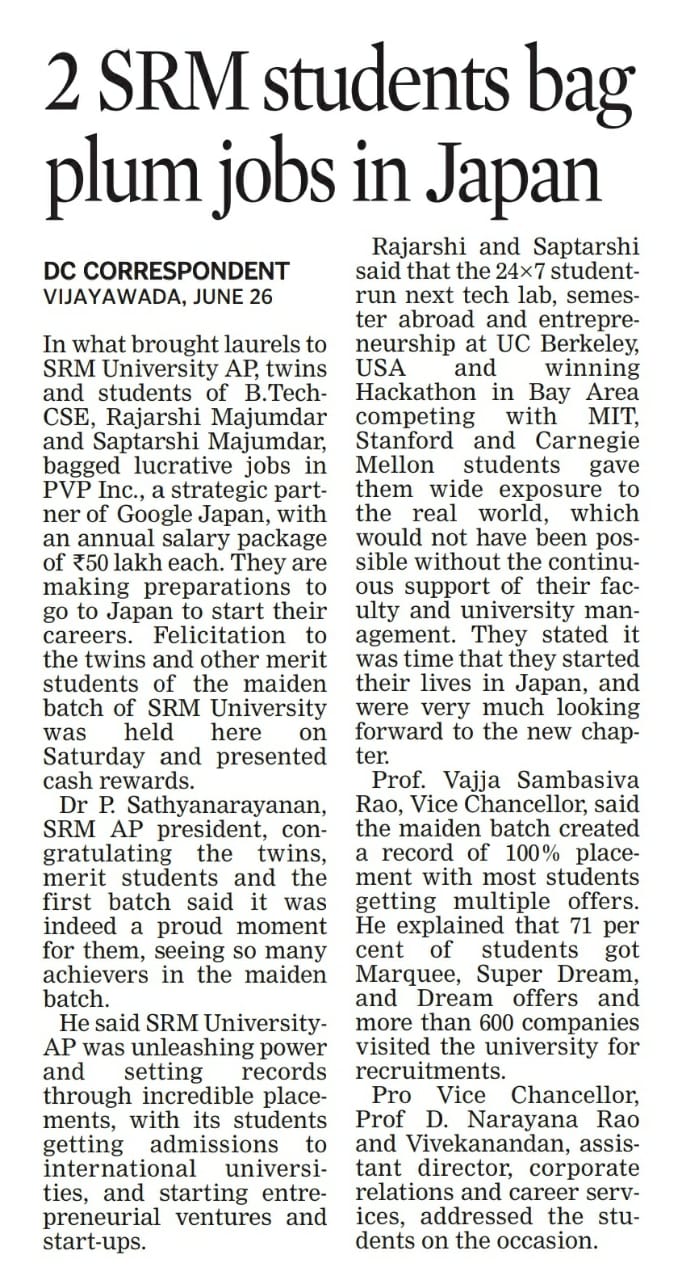
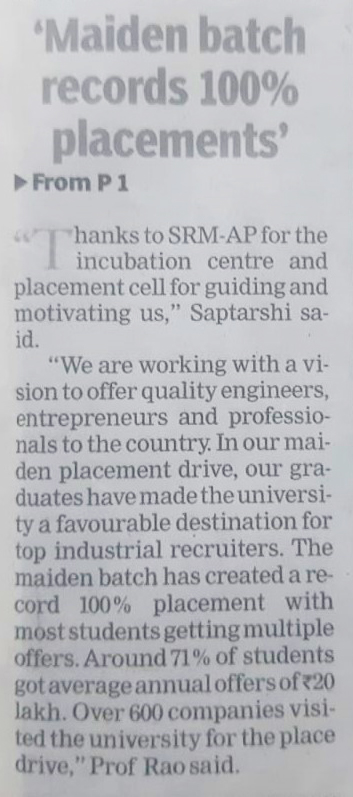
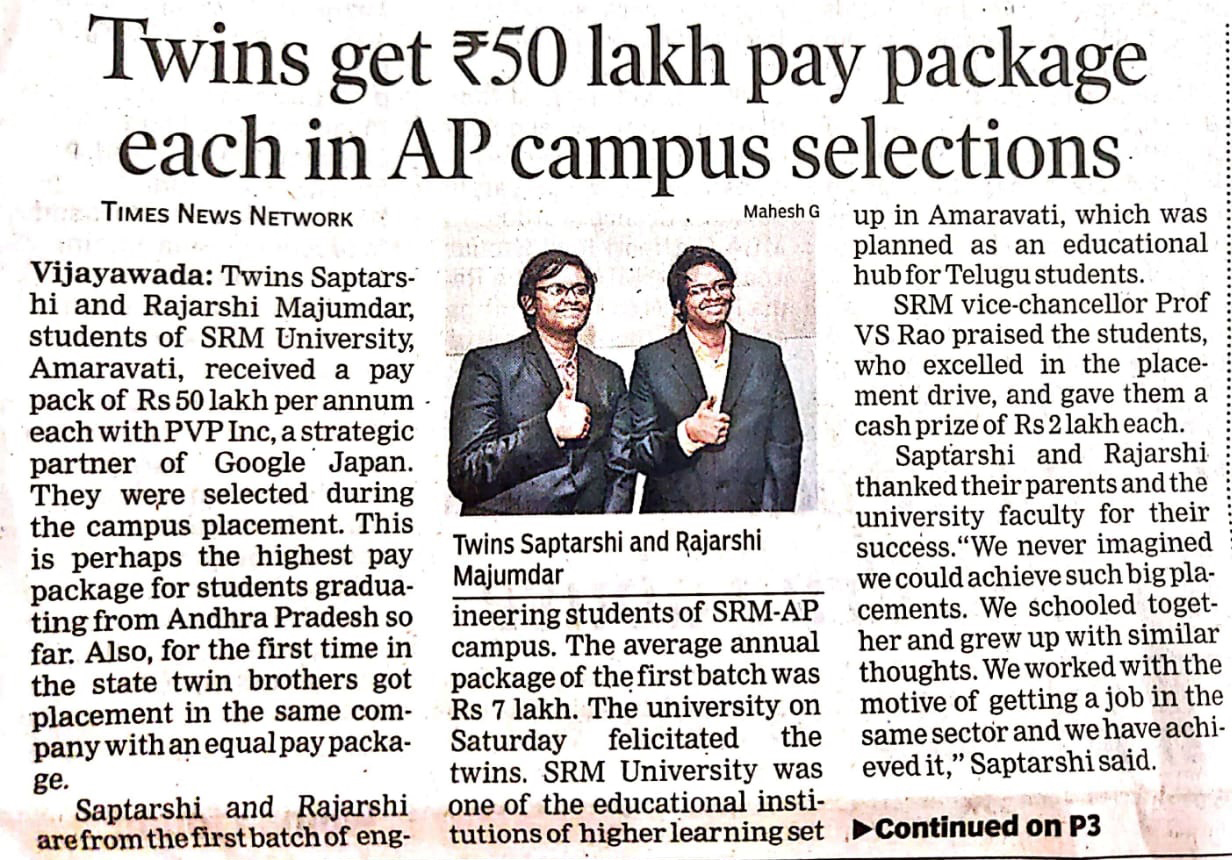
Daily Pioneer – June 27
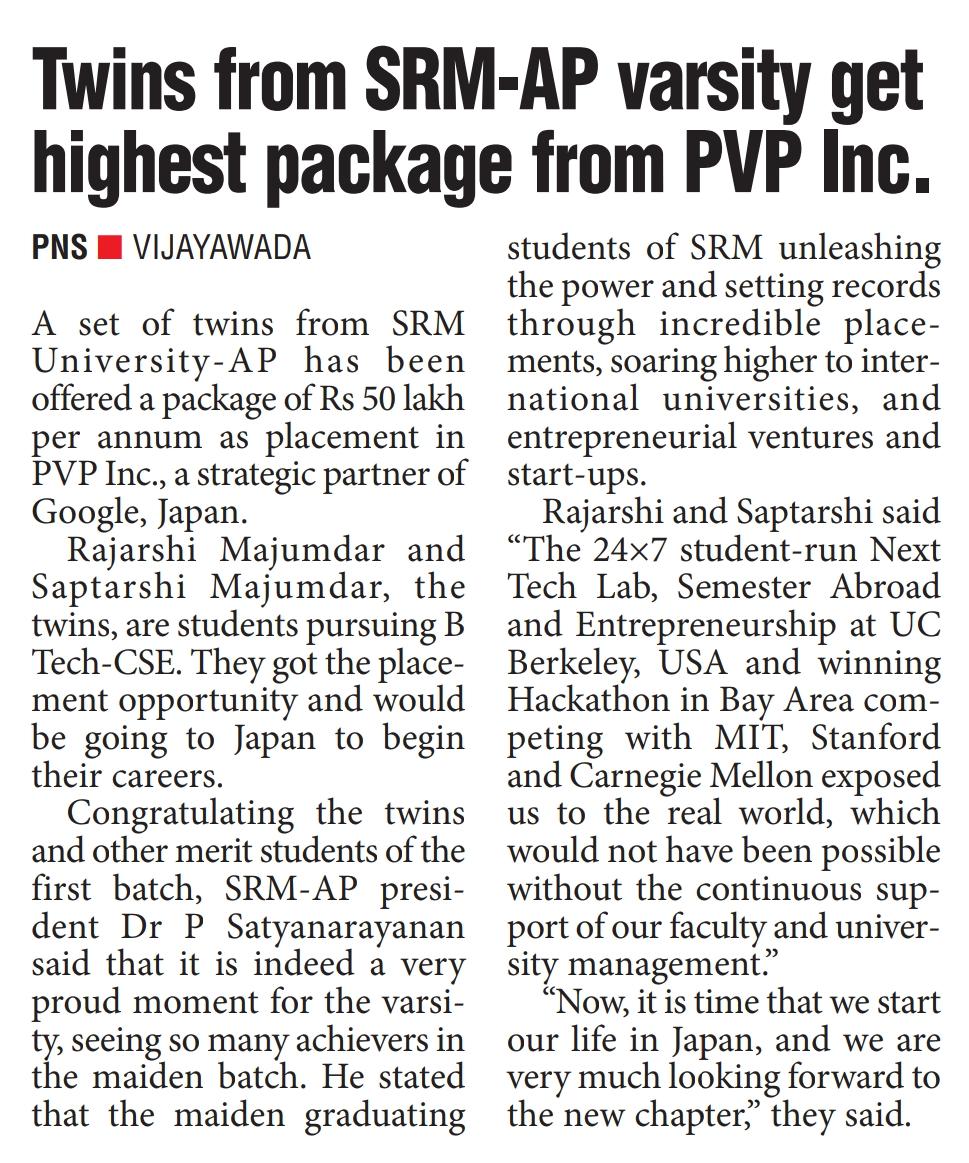
Trinity Mirror – June 27
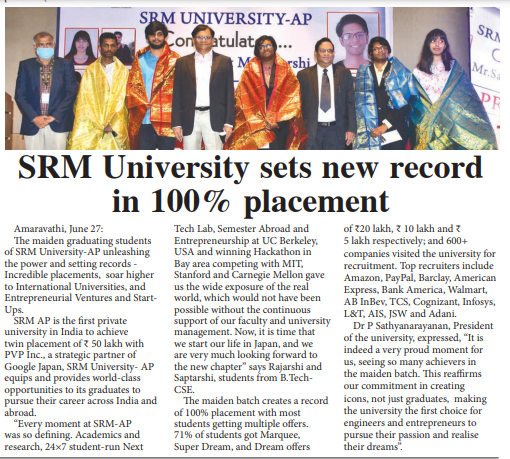
United News of India – June 26
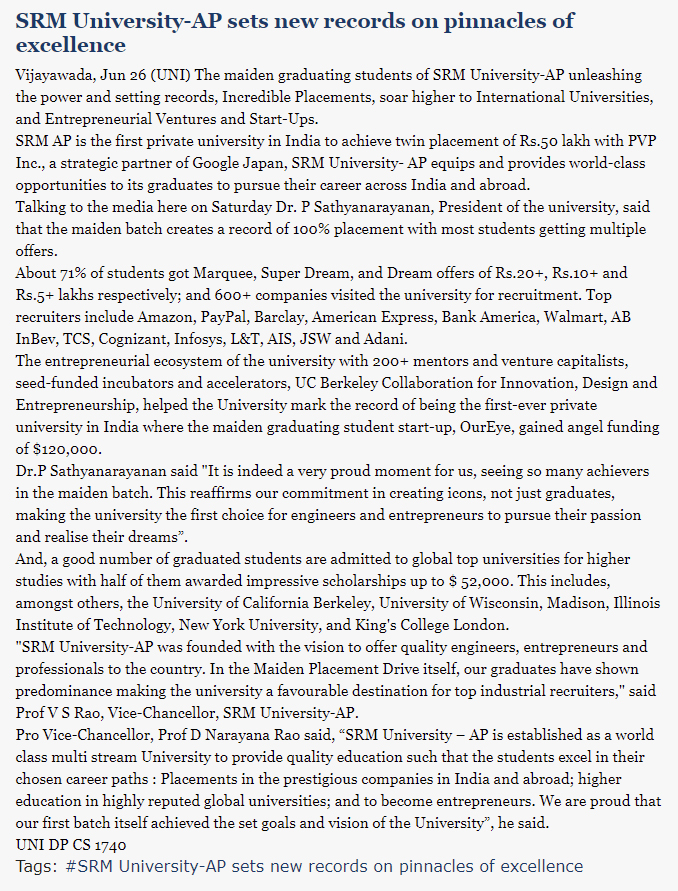
International News and Views – June 27
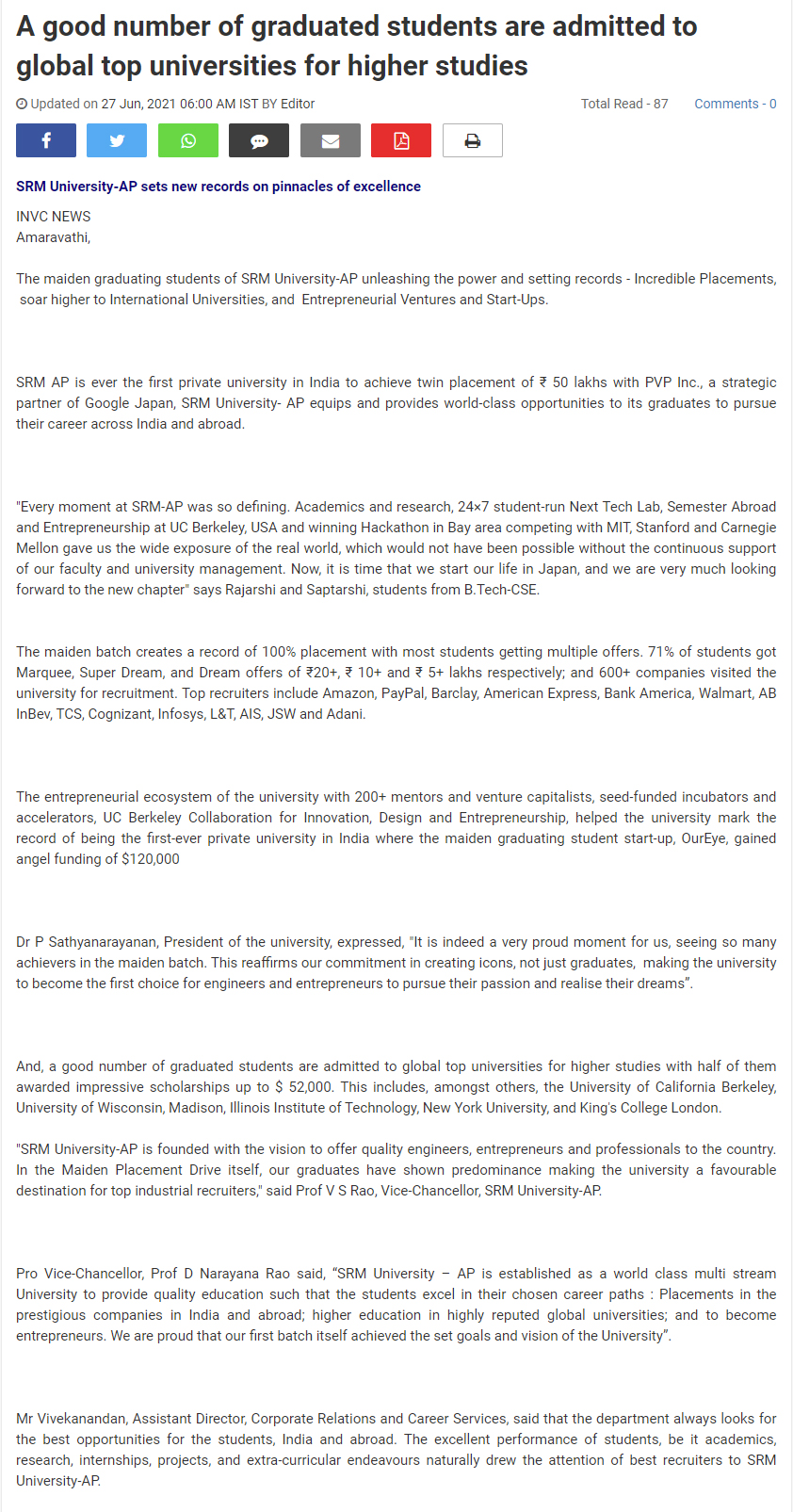
Business News This Week – June 26

Eenadu – June 27
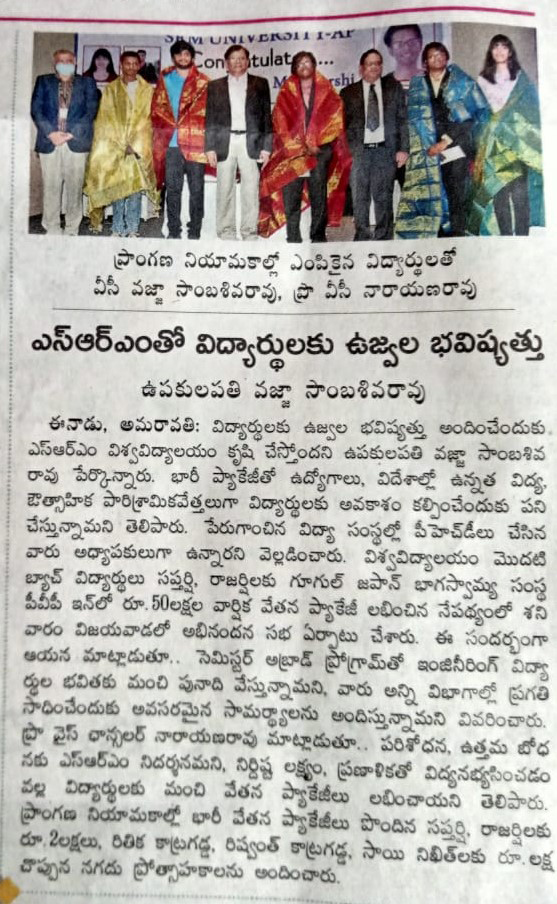
Vartha Prapancham – June 27
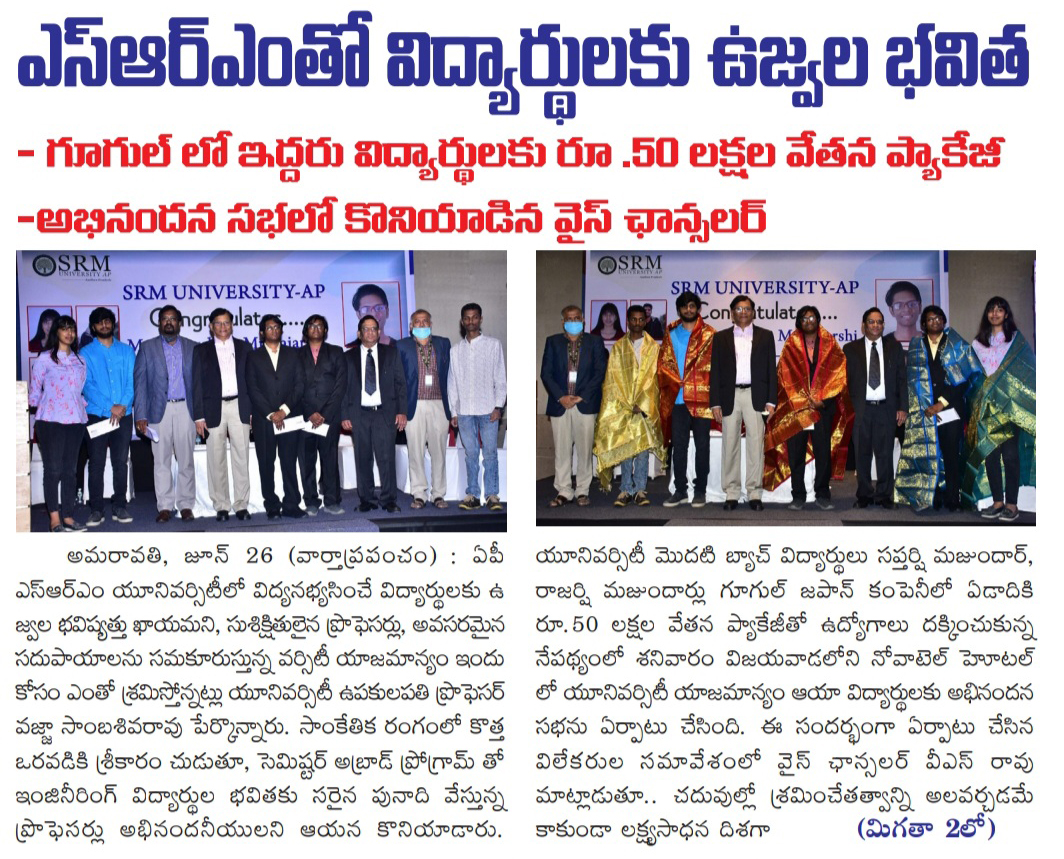
Manam – June 26
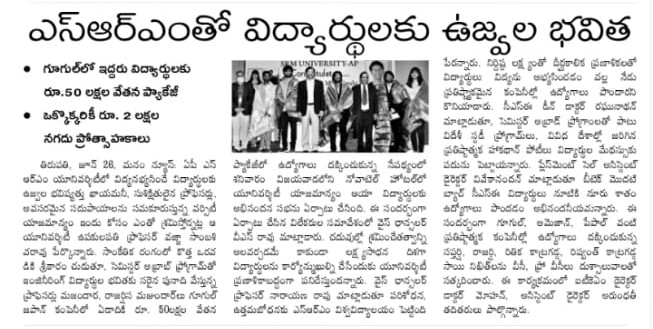
Sakshi – June 27
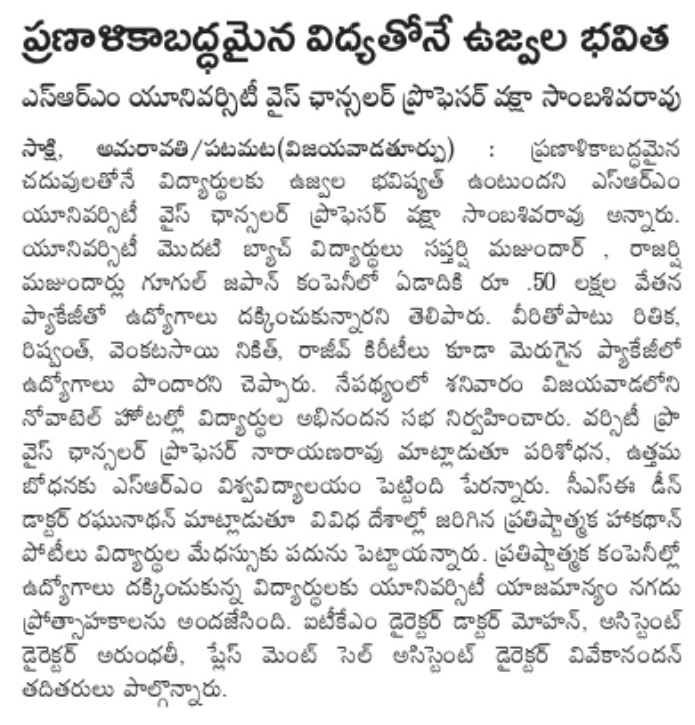
Andhra Prabha – June 27
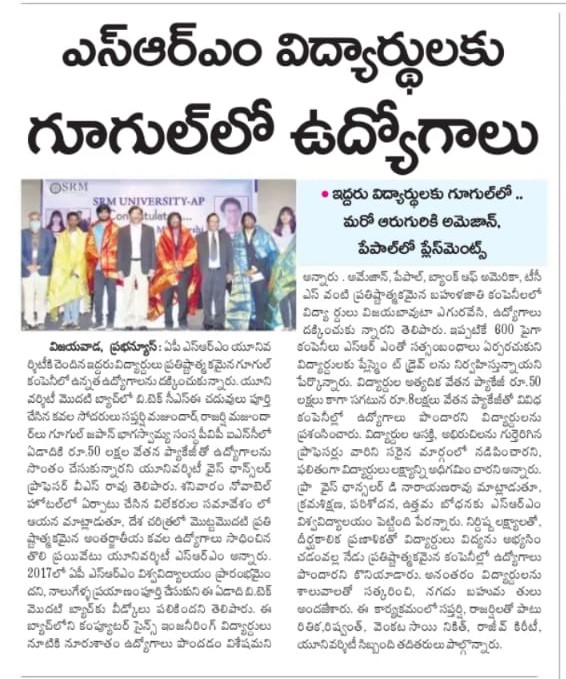
Visalaandhra – June 27
Continue reading →
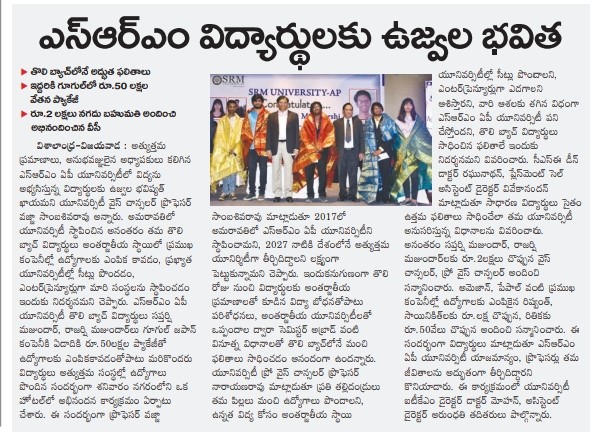
- Panel session: Research opportunities in ECE June 28, 2021
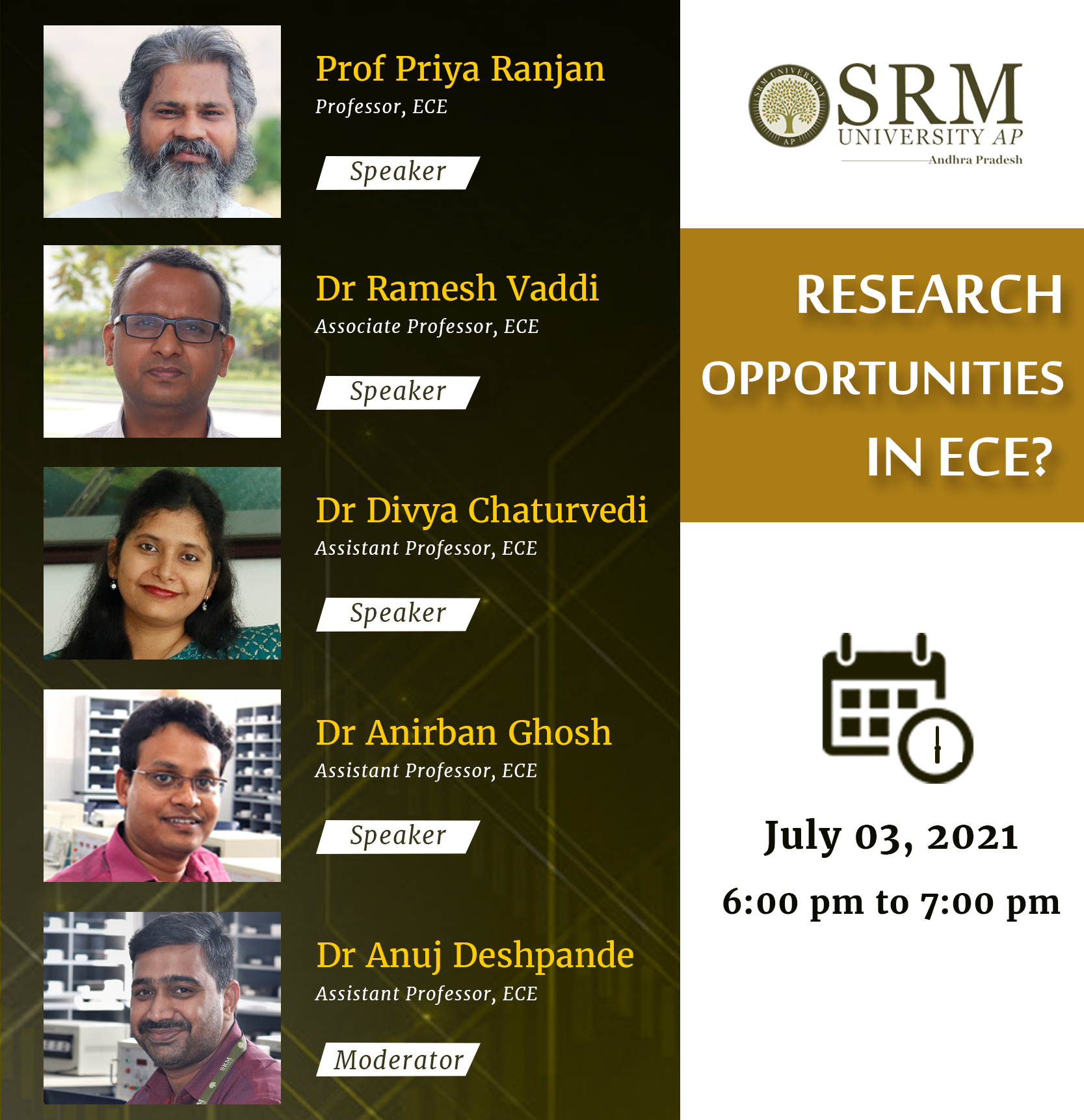 The Department of Electronics and Communication Engineering (ECE) organises a panel session on “Research Opportunities in ECE” to discuss the prospective research areas that a graduate from SRM University-AP can ingress into. The session will be moderated by Dr Anuj Deshpande, Assistant Professor from the department on July 3, 2021, at 6.00 pm.
The Department of Electronics and Communication Engineering (ECE) organises a panel session on “Research Opportunities in ECE” to discuss the prospective research areas that a graduate from SRM University-AP can ingress into. The session will be moderated by Dr Anuj Deshpande, Assistant Professor from the department on July 3, 2021, at 6.00 pm.The panel members and speakers for this programme will be Prof Priya Ranjan, Dr Ramesh Vaddi, Dr Divya Chaturvedi, and Dr Anirban Ghosh.
SRM University-AP offers research guidance and assistance in the fields of AI-enabled Clinical MultiMedia Processing, Battery Research, Future Communication Systems, Hardware Security, RF and Applied Photonics, Systems Biology, and Wearable Electronic Systems. The state of the art research laboratories in the department such as Electronics Laboratory, Communications Systems Laboratory, Microprocessor/Microcontroller Interface Lab, Microwave Laboratory, Digital Signal Processing and VLSI Laboratory aid students to explore the latest technological methodologies of research. The department has also undertaken various research projects sponsored by DST-SERB, DST/INT/RUS/RFBR collaborated with Russian Scientists, ICMR, and DBT.
To know more about the research opportunities that an ECE graduate student can find at their disposal, join this informational panel discussion on July 3, 2021, at 6.00 pm.
Link to register: https://srmap.zoom.us/webinar/register/WN_IERgm1rGS4epzQa9imeqkA
To know more: https://arc2025.srmap.edu.in/seas/electronics-and-communication-engineering/research-areas/
Continue reading → - Dr K Kasturirangan expounds the nuances of NEP-2020 June 28, 2021
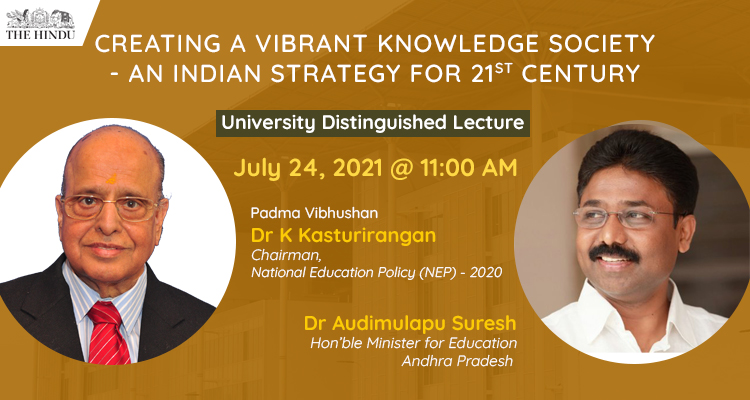 The eleventh edition of the University Distinguished Lecture Series in SRM University-AP, Andhra Pradesh, is scheduled to be held on July 24, 2021, Saturday, at 11.00 am. Padma Vibhushan awardee Dr K Kasturirangan, Chairman, National Education Policy-2020 (NEP), will deliver the virtual lecture as the chief guest. Dr Audimulapu Suresh, minister of education in the government of Andhra Pradesh, will also join the esteemed lecture.
The eleventh edition of the University Distinguished Lecture Series in SRM University-AP, Andhra Pradesh, is scheduled to be held on July 24, 2021, Saturday, at 11.00 am. Padma Vibhushan awardee Dr K Kasturirangan, Chairman, National Education Policy-2020 (NEP), will deliver the virtual lecture as the chief guest. Dr Audimulapu Suresh, minister of education in the government of Andhra Pradesh, will also join the esteemed lecture.In the lecture titled “Creating a Vibrant Knowledge Society – An Indian Strategy for 21st Century”, Dr Kasturirangan will explicate the nuances underlying the conceptualisation of National Education Policy 2020. Being the first education policy of the 21st century, NEP 2020 proposes to address the many growing developmental imperatives of our country. This policy aims to revise and revamp all aspects of the education structure, including its regulation and governance, and create a new system that is aligned with the aspirational goals of 21st-century education while building upon India’s traditions and value systems.
More about the Distinguished Guest:
Dr K. Kasturirangan is currently Chancellor, Central University of Rajasthan; Chairman, Governing Board, Inter-University Centre for Astronomy and Astrophysics (IUCAA); Chairperson, NIIT University, Neemrana; Member, Atomic Energy Commission, Emeritus Professor at National Institute of Advanced Studies (NIAS), Bangalore and Honorary Distinguished Advisor, Indian Space Research Organisation (ISRO). He has been conferred with the highest civilian honours Padma Shri (1982), Padma Bhushan (1992) and Padma Vibhushan (2000) by the President of India, the Rajyotsava Prashasthi (2014) from Government of Karnataka and Award of ‘Officer of the Legion d’honneur’ (2002) by the President of the French Republic, France.Every month, the University Distinguished Lecture (UDL) hosted by SRM University-AP is being attended by about 2000 members from IITs, NITs, IISERs, Universities/institutions, CSIR, DST, DBT, DRDO, DAE, ISRO, NARL, MoES and several others from different parts of the country. We gladly invite you to attend the enlightening UDL-11 session with the doyen of the Indian education system, Dr K Kasturirangan.
Register here: https://srmap.zoom.us/webinar/register/WN_49Zwu_m8Srep-qrnNWMW0Q (Registration Closed)
Continue reading → - End of Second Wave of COVID – 19 in 8 States of India June 28, 2021
A research study to predict the waning of the second wave of COVID-19 in Uttar Pradesh, Delhi, Karnataka, Maharashtra, Andhra Pradesh, Tamil Nadu, Kerala & West Bengal
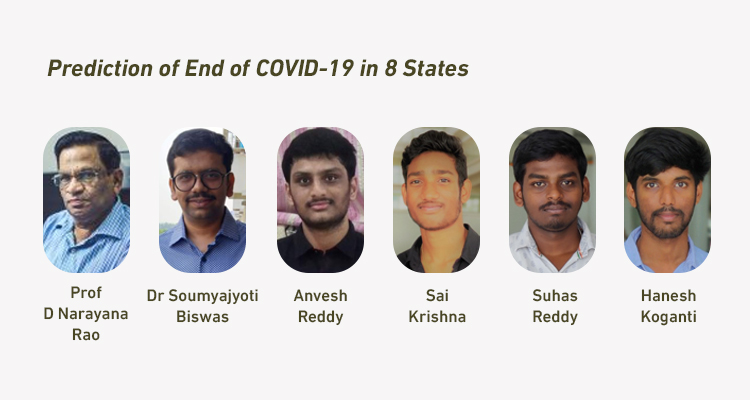
In the current pandemic situation, a pertinent question is the estimate of time by which the second wave of COVID – 19 spread could be contained and normalcy would return. In this context, Prof. D. Narayana Rao, Pro-Vice-Chancellor, SRM University – AP initiated the study to predict the End-Time of COVID – 19 in the states of Uttar Pradesh, Delhi, Karnataka, Maharashtra, Andhra Pradesh, Tamil Nadu, Kerala & West Bengal. Dr. Soumyajyoti Biswas of SRM University – AP along with 4 B.Tech Students: Mr. Anvesh Reddy, Mr. Hanesh Koganti, Mr. Sai Krishna, and Mr. Suhas Reddy have carried out an interesting study to predict the end time of the second wave of COVID – 19 spread in these states. Study employed Susceptible – Infected – Recovered (SIR) Model making use of the information on the COVID – 19 affected people and the number of recovered people, the data which the state governments make them available. SRM Team made use of these data employed SIR Model and applied the methods of Machine Learning. The End -Times of the spread of COVID-19 for different states are given in the following table:States Uttar Pradesh Delhi Karnataka Maharashtra Andhra Pradesh Tamil Nadu Kerala West Bengal End-time May 27 May 28 July 1 July 13 July 16 July 26 August 12 September 2 Errors -2 days, + 3 days -2 days, + 2 days – 6 days, + 5 days -7 days, + 7 days -16 days, + 28 days -17 days, + 33 days -14 days, + 14 days -30 days, + 30 days End-Time is defined as the date on which the number of COVID affected cases get reduced to 5% of the peak number of cases occurred in the particular state.
The model is also validated with the actuals occurred in the States of Delhi and Uttar Pradesh.
Uttar Pradesh: Peak of 37,944 was n 24th April 2021 and 5% of the peak number is 1897 and is predicted to occur on 27th May with an error of -2 days to +3 days
Actuals: 27th May: 3179, 28th May: 2276, 29th May: 2014, 30th May: 1864Delhi: Peak of 28,935 was on 20th April 2021 and 5% of the peak number is 1490 and is predicted to occur on 28th May with an error of – 2 days to + 2 days
Actuals:26th May: 1491, 27th May : 1072, 28th May : 1141The validation mentioned of the end-times of the second wave of COVID-19 spread increases our confidence level to the predictions made for other states also.
It can be noticed that in the States of West Bengal, Kerala, Tamil Nadu, and Andhra Pradesh, the second wave of COVID-19 continues to spread for longer periods and errors are large compared to the other states of Uttar Pradesh, Delhi, Karnataka, and Maharashtra. Perhaps, these factors could be attributed to the large gatherings that have occurred in the 4 states on several occasions.
Prof Narayana Rao said that these predictions mentioned above could help in estimating the impact on medium and small business sectors. In the education sector, it could help in planning the academic sessions, examinations, etc. It could also help to plan necessary medical infrastructure for healthcare in different states.
The details of the study can be found in [2105.13288] Machine learning predictions of COVID-19 second wave end-times in Indian states (arxiv.org)
Continue reading →


